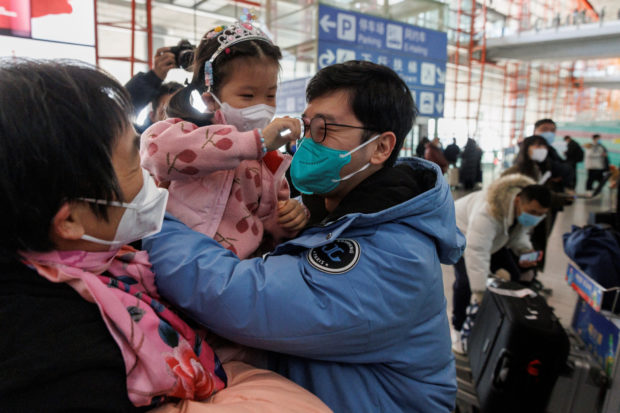
People embrace at the international arrivals gate at Beijing Capital International Airport after China lifted the coronavirus disease (COVID-19) quarantine requirement for inbound travellers in Beijing, China January 8, 2023. REUTERS FILE PHOTO
BEIJING — China began retaliating on Tuesday against South Korea and Japan, two of the countries which have imposed COVID-19 curbs on travelers from China, the last major economy to reopen its borders after three years of isolation.
China’s embassy in Seoul said it has suspended the issuance of short-term visas for visitors from South Korea. Japan’s Kyodo news agency reported that Beijing has imposed similar measures against Japan.
China reopened its borders on Sunday, removing the last major restriction that was part of a “zero-COVID” regime which it abruptly began dismantling in early December after historic protests against the curbs.
The frequent lockdowns, relentless testing and various other movement curbs since early 2020 have brought the world’s second-largest economy to one of its slowest growth rates in nearly half a century and caused widespread distress.
With the virus let loose, China has stopped publishing daily infection tallies. It has been reporting five or fewer deaths a day since the policy U-turn, figures that have been disputed by the World Health Organisation and are inconsistent with funeral homes reporting a surge in demand for their services.
The United States, South Korea, France and others introduced testing requirements in response to China’s COVID outbreak.
Some governments have raised concerns about Beijing’s transparency over the scale and impact of its outbreak, as international experts predict at least 1 million deaths in China this year. Washington has also raised concerns about future potential mutations of the virus.
Although Beijing also demands negative COVID test results from anyone landing in China, officials last week threatened retaliation against countries mandating tests for people coming from China.
China’s embassy in Seoul said on its official WeChat account it will adjust its latest visa rules subject to the lifting of South Korea’s “discriminatory entry restrictions” against China.
China has also told travel agencies that it has stopped issuing new visas in Japan, Kyodo said, quoting multiple travel industry sources.
China has dismissed criticism over its data as politically-motivated attempts to smear its “success” in handling the pandemic and said any future mutations are likely to be more infectious but less harmful.
State media on Tuesday continued to downplay the severity of the outbreak.
An article in Health Times, a publication managed by People’s Daily, the Communist Party’s official newspaper, quoted several officials as saying infections have been declining in the capital Beijing and several Chinese provinces.
Kan Quan, director of the Office of the Henan Provincial Epidemic Prevention and Control, said the infection rate in the central province of 100 million people was nearly 90% as of Jan. 6.
Yin Yong, acting mayor of Beijing, said the capital was also past its peak. Li Pan, deputy director of the Municipal Health Commission in the city of Chongqing said the peak there was reached on Dec. 20.
In the province of Jiangsu, the peak was reached on Dec. 22, while in Zheijiang province “the first wave of infections has passed smoothly,” officials said. Two cities in the southern Guangdong province, China’s manufacturing heartland, reached their peaks before the end of the year.
RELATED STORIES
South Korea seeks Chinese national missing from COVID-19 quarantine
More countries roll out China traveller checks amid COVID-19 surge